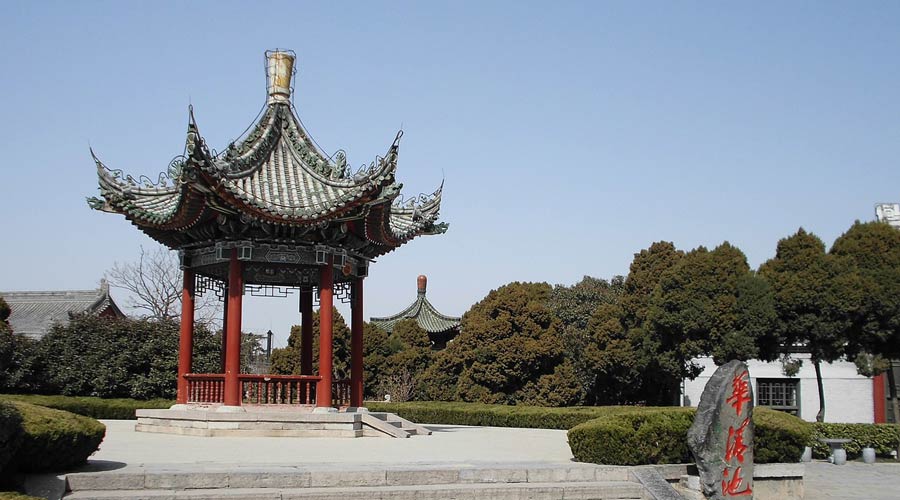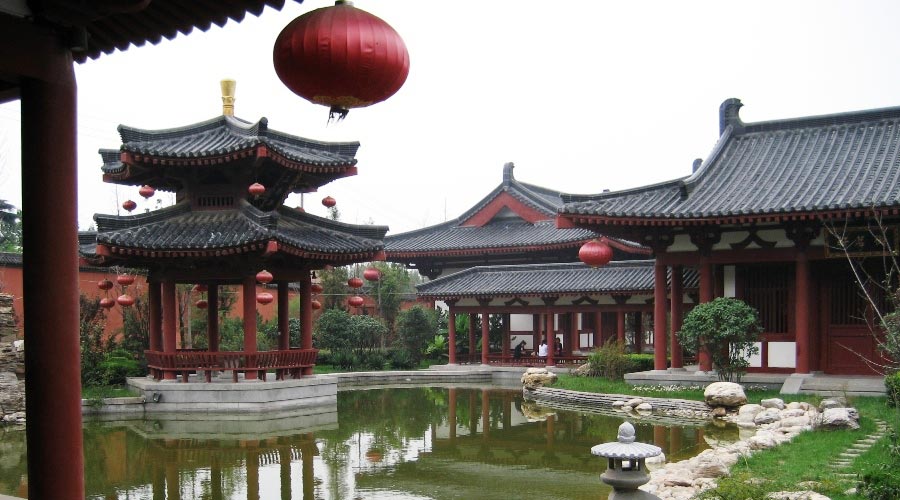Huaqing Pool, also known as Huaqing Hot Springs, is a breathtaking complex of thermal springs nestled in an area blessed with stunning scenic views, a rich tapestry of history, and pleasantly mild weather. Located on the northern slopes of Mount Li in the eastern vicinity of Xi’an, China, this historic site has served as a haven for relaxation and cultural reflection for centuries. Recognized as an AAAAA scenic area by China’s National Tourism Administration, Huaqing Pool continues to captivate countless visitors every year.
A Glimpse into History
Once the imperial hot spring complex of the Tang Dynasty (618–907), Huaqing Pool was cherished as a luxurious retreat where emperors and their consorts soaked in the therapeutic waters. Its renown is also enhanced by its proximity to the magnificent Terracotta Army – one of China’s most celebrated archaeological wonders.
The hot spring has played host to many illustrious figures over the centuries. Rulers such as King You during the Zhou Dynasty, Qin Shi Huang of the Qin Dynasty, and Han Dynasty’s Wu Han, to name a few, left their mark on this historic retreat. In 723, Emperor Xuanzong of the Tang Dynasty rebuilt the Huaqing Palace complex here, a site forever steeped in romance, as it is said that his legendary affair with Yang Guifei unfolded within its walls.
Although the site sustained significant damage following the events of the An Lushan Rebellion, its historical legacy endures. Even Bai Juyi immortalized the love story of Emperor Xuanzong and Yang Guifei in his poetry. In more modern times, the 1936 Xi’an Incident unfolded here when former warlord Zhang Xueliang detained Chiang Kai-shek, an event that spurred a united front against the Japanese threat.
Exploring the Huaqing Pool Complex
The Huaqing Pool complex is a labyrinth of historically and culturally rich sections that invite visitors to step back in time.
Imperial Pools of the Tang Dynasty
The complex includes five distinct hot spring pools, each with its unique story:
- The Lotus Pool
- Haitang Pool
- Star Pool
- Shangshi Pool
- The Prince Pool
The Lotus Pool
Resembling a lotus flower, the Lotus Pool was cherished by Emperor Xuanzong as his private bathing spot.
Haitang Pool
Also known as Guifei Pool, this pool takes its name from its resemblance to a Chinese crabapple and is linked to Yang Yuhuan’s legacy.
Star Pool
Without a covering roof, the Star Pool offers a spectacular view of the night sky – an ideal setting for stargazing.
Shangshi Pool and the Prince Pool
Historically, the Shangshi Pool was reserved for officials, while the Prince Pool was set aside for royalty.
Pear Garden: The Imperial Theater
One of China’s most famous imperial theaters, the Pear Garden, was where Emperor Xuanzong and Yang Yuhuan once created enchanting tunes and dances. Although many of these historical performances have faded with time, the legacy of masterpieces such as “Ni Shang Yu Yi Qu” lives on in local lore.
Frost Flying Hall
Known in Chinese as Feishuang Hall, this former bedroom palace of Emperor Xuanzong earned its name from a peculiar phenomenon – the warm air from the hot springs causes snow to transform rapidly into frost during winter.
Nine-Dragon Lake
South of Frost Flying Hall and the Pear Garden, Nine-Dragon Lake stretches over approximately 530 square meters (634 square yards) and is divided into two sections joined by a picturesque bridge. The lake is named for the nine stone carvings of dragons – eight adorning the bridge and a ninth nestled beneath a lakeside pavilion.
Five-Room Building
This historical structure once sheltered Empress Dowager Cixi in 1900 during the capture of Beijing by the Eight-Power Allied Force. It also served as a temporary residence for Chiang Kai-shek during the December 12, 1936 Xi’an Incident, when he was detained and later compelled to unite the Chinese people in the resistance against invading forces.
Mount Li – Nature and History Combined
Mount Li, an integral part of the Huaqing Pool Scenic Area, is famed not only for its natural beauty but also for the Beacon Tower fortification dating back to the Western Zhou Dynasty. The recently updated cableway facility makes ascending the mountain a memorable part of your visit. For a round trip on the cableway, you need to purchase a 60 Yuan ticket.

The Song of Everlasting Sorrow Show
Enhance your visit to Huaqing Pool by experiencing The Song of Everlasting Sorrow Show – an outstanding evening performance that brings the rich legacy of the Tang Dynasty to life. The show offers visitors a unique insight into one of China’s most legendary love stories, that of Emperor Xuanzong and Yang Guifei, using a blend of traditional music, Tang-style dance, and evocative poetic narration.
English brochures are available for international guests, ensuring you fully appreciate the historical nuances and captivating emotions of each scene. With 10 distinct scenes depicting the various stages of Yang’s life, the performance has enchanted over 3.5 million viewers since its inception in 2007.
Show Details:
- Performance Season: April 1st to October 31st
- Duration: Approximately 70 minutes per show
There are two daily performances:
First Performance: Ticket checking at the West Gate (Wangjing Gate) at 19:30, followed by the show from 20:10 to 21:20.
Second Performance: Ticket checking at the East Gate (Jinyang Gate) at 21:40, with the performance running from 21:40 to 22:50.
Ticket Prices for the Show
Ticket prices are based on seating selection:
- Standard Seats: 238 to 368 Yuan
- VIP Section: 588 to 988 Yuan
Buses
Special buses are provided to return you from the show to the downtown area within an hour.
Tourist Guide
How to get to Huaqing Pool?
From Xi’an Railway Station
If you’re arriving in Xi’an, you can catch Tourist Bus No. 5, 306, 914, or 915 directly to Huaqing Chi Station. The journey from Xi’an takes approximately an hour.
From Tang Paradise
Visitors leaving the West or South Gate of Tang Paradise can board Bus No. 307 directly to Huaqing Chi Station.
From Lintong
If you’re coming from Lintong, take Bus No. 101 to Huaqing Chi Station. For those arriving by train, be sure to collect your free shuttle bus ticket at the Tourist Service Center located in the Xi’an North Railway Station’s underground area – an ideal convenience if you plan to extend your journey exploring nearby attractions.
General Ticket Prices for Huaqing Pool
- Huaqing Palace Ticket: 120 Yuan
- Huaqing Pool Scenic Area Ticket (including Mount Li): 160 Yuan
- Ticket for Mount Li (Cableway): 30 Yuan one-way, or 60 Yuan round trip
- Children: Free for children under 1.2 meters (3.9 feet)
Operating Hours
- From March to November: 7:00 to 19:00
- From December to February: 7:30 to 18:00
Please note that while visitors are not allowed to bathe in the natural hot springs on-site, you can indulge in similar therapeutic experiences at nearby accommodations. Properties such as the Huaqing Palace Resort & Spa – located on the west side of the palace – offer hot spring facilities reminiscent of those enjoyed by Emperor Xuanzong and Yang Yuhuan. Since room availability is limited, early booking is highly recommended.
Have you tried hot springs before? Let us know about your experience in the comments below. For any queries regarding Huaqing Pool or its rich history, feel free to contact our knowledgeable guides.
